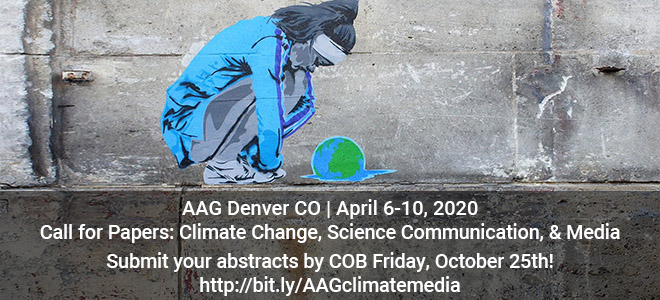
AAG Session, April 6-10, 2020
Organizers:
Meaghan Daly, University of New England
Lucy McAllister, Babson College
Jeremiah Osborne-Gowey, University of Colorado Boulder
Session Sponsorship:
Cultural and Political Ecology Specialty GroupHuman Dimensions of Climate Change Specialty Group
Media and Climate Change Observatory (MeCCO) at University of Colorado Boulder
Submit your abstracts by COB Friday, October 25th! http://bit.ly/AAGclimatemedia
In recent years, there have been increasing efforts to enhance public understanding of climate change. The field of science communication has grown rapidly in an effort to ‘bridge the gap’ between scientific knowledge about and societal responses to climate change (Moser, 2016). Similarly, the media – ranging from print, broadcast, and web resources – has played an increasingly vital role in shaping public perceptions and opinions about climate change, including available options for mitigating and adapting to change (Boykoff, 2011). Yet, significant questions remain about how best to communicate and engage with the public on the issue of climate change and what role the media should play in advancing these efforts. Furthermore, there is much evidence demonstrating that simply delivering more scientific information does not always result in greater public understanding or action to address wicked problems such as climate change – and may, in fact, even be counterproductive in some cases (O’Neill & Nicholson-Cole, 2009; Nisbet, Cooper, & Garrett, 2015). The ways in which climate change is understood, framed, portrayed, and taken up is subject to myriad social, political, historical, and cultural influences (Hulme, 2009).
This paper session will survey the current landscape of communications and media coverage of climate change – including assessment and critiques of theoretical underpinnings, methodological approaches, and potential policy solutions – while also creating space to productively situate these efforts within wider discussions about the role of expertise and values in shaping public understandings of science, decision-making, behavioral change, and policy-making. Thus, this paper session will examine the broader landscape of communications approaches and media coverage of climate change, including what they can and cannot tell us, while also offering insights toward potential paths forward. Sessions will be structured to foster constructive dialog among presenters, discussants, and audience members.
Papers in these sessions may address, but are not limited to, the following questions:
- What are new or innovative theories for understanding climate communication and the media?
- What are different methodological approaches currently being applied in the field?
- What are the strengths and limitations of various methodological approaches?
- What are the policy and/or practical implications of current approaches to studying climate communications in the media?
- What are future trajectories for communicating on the issue of climate change and what role can / should the media play?
- What is the current role of experts/expertise in the science communication-media nexus and, just as importantly, what role should they have in the future?
Please submit abstracts of interest of no more than 250 words to Meaghan Daly (mdaly8@une.edu), Lucy McAllister (lmcallister@babson.edu), and Jeremiah Osborne-Gowey (jeremiah.osbornegowey@colorado.edu) by close of business, October 25th, 2019. Presenters will be notified of acceptance no later than October 28th, 2019. If accepted, presenters should register their abstract and send their PIN to organizers by October 30th.
Citations:
Boykoff, M. T. (2011). Who speaks for the climate?: Making sense of media reporting on climate change. Cambridge University Press.
Hulme, M. (2009). Why we disagree about climate change: Understanding controversy, inaction and opportunity. Cambridge University Press.
Moser, S. C. (2016). Reflections on climate change communication research and practice in the second decade of the 21st century: what more is there to say?. Wiley Interdisciplinary Reviews: Climate Change, 7(3), 345-369.
Nisbet, E. C., Cooper, K. E., & Garrett, R. K. (2015). The partisan brain: How dissonant science messages lead conservatives and liberals to (dis) trust science. The ANNALS of the American Academy of Political and Social Science, 658(1), 36-66.
O’Neill, S., & Nicholson-Cole, S. (2009). “Fear won’t do it” promoting positive engagement with climate change through visual and iconic representations. Science Communication, 30(3), 355-379.

